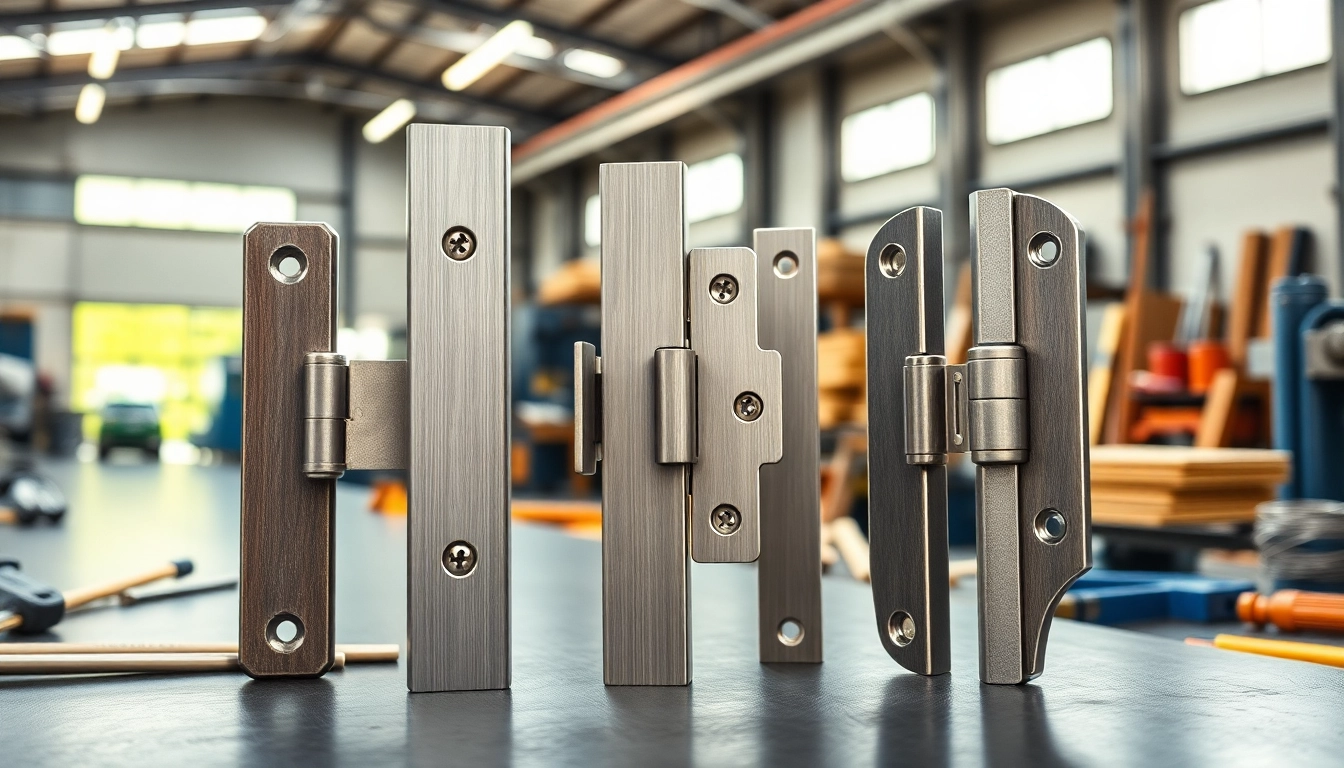Understanding Door Hinges and Their Importance
When it comes to door functionality, the importance of door hinges cannot be overstated. These often-overlooked hardware components are critical for the seamless operation of doors in both residential and commercial spaces. Whether you’re picking out hinges for new construction or replacing old ones, understanding the various types and quality standards is essential. As the choice of a Door Hinges Manufacturer can greatly impact your overall experience, let’s delve into what door hinges are, their types, and why quality matters.
What Are Door Hinges?
Door hinges are mechanical devices that allow doors to pivot open and closed. They consist of two plates (known as leaves) joined by a pin, allowing a door to swing without removing it from the frame. The placement, style, and type of hinge can vastly affect a door’s functionality, look, and longevity.
Types of Door Hinges Available
Door hinges come in various styles, engineered to serve different functions and aesthetics. Here’s a breakdown of the most common types:
- Butt Hinges: The most common type used in residential and commercial applications, these are versatile and strong.
- Continuous Hinges (Piano Hinges): These run the full length of the door and provide superior support, useful for heavy doors.
- Spring Hinges: Designed to automatically return doors to a closed position, ideal for fire doors or entryways.
- Concealed Hinges: Hidden from view, they create a clean look, often used in cabinetry.
- Heavy-Duty Hinges: Built for doors that undergo high traffic and stress, typically used in commercial settings.
Why Quality Matters in Door Hinges
The quality of a hinge directly influences its durability and performance. High-quality hinges can endure the stresses of daily use, ensuring doors operate smoothly for years. When selecting hinges, consider materials such as stainless steel for corrosion resistance and weight-bearing performance. The thickness and finish can also contribute to longevity and aesthetic appeal.
Choosing the Right Door Hinges Manufacturer
Choosing the right manufacturer is crucial for acquiring durable and reliable door hinges. Here are some tips on how to make a wise selection.
Evaluating Manufacturer Reputation
Research is vital when selecting a door hinges manufacturer. Look at reviews, testimonials, and case studies. Engage with trade organizations for information about reputable manufacturers. Additionally, manufacturers that have been in the industry for several years often have proven records and extensive product lines which can be promising indicators of quality.
Key Features to Look For
Focus on specific features that enhance the functionality and security of your door hinges, such as:
- Load Bearing Capacity: Ensure the hinges can support the weight of the door without sagging.
- Weather Resistance: If the hinges are for exterior doors, select rust-proof materials.
- Security Features: Some hinges come with tamper-proof designs critical for entry doors.
- Warranty: A good warranty can often be an indicator of quality, adding peace of mind.
Comparing Pricing and Value
While it’s tempting to go for the cheapest option, consider the overall value. Sometimes, spending slightly more on a quality hinge can save you money in replacements and repairs down the line. Compare features against price points to ensure you’re getting the best deal.
Common Applications for Door Hinges
Understanding where door hinges can be applied can help you choose the right type for your needs.
Residential Uses of Door Hinges
In homes, door hinges are primarily used on interior and exterior doors. They need to be functional but also aesthetically pleasing to complement home decor. Choices often involve a combination of butt hinges and concealed hinges.
Commercial Applications
In commercial settings, door hinges must handle not just weight, but also frequent use. Heavy-duty hinges, continuous hinges, and those with safety features are common in offices, schools, and hospitals due to their robustness.
Heavy-Duty Hinges for Industrial Settings
Industrial settings often require specialized hinges that can stand up to extreme wear and tear. These hinges are made from reinforced materials and can withstand heavier, frequently used doors, ensuring operational efficiency without compromising safety.
Installation Best Practices for Door Hinges
Proper installation is key to the longevity and functionality of door hinges. Here are essential practices to follow.
Preparation Steps Before Installation
Before beginning installation, ensure you have all necessary components. Check the following:
- {@code Door hinges}
- {@code Screws and/or anchors}
- {@code Leveling tools}
- {@code Measuring tape and drill}
Tools Required for Proper Installation
The following tools will aid in the efficient installation of door hinges:
- Power Drill
- Driver Bits
- Measuring Tape
- Level
- Screwdriver
Common Mistakes to Avoid
Even minor mistakes during installation can affect hinge performance. Here are some pitfalls to avoid:
- Misalignment: Ensure hinges are level and aligned properly; misalignment can lead to wear over time.
- Incorrect Screws: Use screws that are too long may damage the door or frame.
- Rushing the Installation: Take your time to ensure everything is secure before closing the door.
Maintaining Your Door Hinges for Longevity
Regular maintenance is crucial for ensuring that door hinges function optimally for years. Here’s how you can keep your door hinges in excellent condition.
Regular Maintenance Tips
Performing periodic maintenance can greatly extend the lifespan of your door hinges. Here are some helpful tips:
- Clean the hinges with a soft cloth to remove dirt and debris.
- Inspect the screws for tightness and replace any that are stripped or missing.
- Consider applying paint or a sealant for outdoor hinges to protect against corrosion.
Signs Your Hinges Need Replacement
It’s important to recognize when hinges are failing. Common signs include:
- Unusual noises, like squeaking or creaking.
- Doors that don’t close properly or sag at odd angles.
- Visible rust or corrosion.
The Role of Lubrication in Hinge Performance
Regular lubrication is pivotal in ensuring smooth operation. Apply a silicone-based lubricant or graphite for optimal performance. Avoid using grease as it can attract dirt and debris, leading to grime buildup.
